
Michael Latham Powell was an English filmmaker, celebrated for his partnership with Emeric Pressburger. Through their production company The Archers, they together wrote, produced and directed a series of classic British films, notably The Life and Death of Colonel Blimp (1943), A Canterbury Tale (1944), I Know Where I'm Going! (1945), A Matter of Life and Death, Black Narcissus (1947), The Red Shoes (1948), and The Tales of Hoffmann (1951). His later controversial 1960 film Peeping Tom, while today considered a classic, and a contender as the first "slasher", was so vilified on first release that his career was seriously damaged.
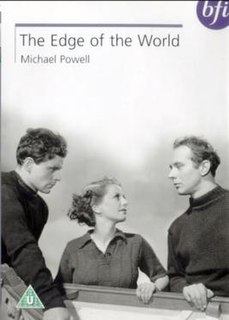
The Edge of the World is a 1937 British film directed by Michael Powell, loosely based on the evacuation of the Scottish archipelago of St Kilda. It was Powell's first major project. The title is a reference to the expression ultima Thule, coined by Virgil.

Red Ensign is a 1934 film directed by British filmmaker Michael Powell. It is an early low-budget "quota quickie".
Lazybones is a 1935 British film directed by Michael Powell. It was made as a Quota quickie.
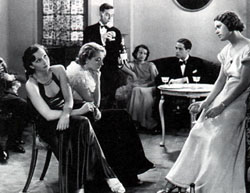
The Girl in the Crowd is a 1935 British comedy film directed by Michael Powell starring Barry Clifton, Patricia Hilliard, and Googie Withers.

The Love Test is a 1935 British romantic comedy film directed by Michael Powell and starring Judy Gunn, Louis Hayward, David Hutcheson, Googie Withers and Thorley Walters. It was made as a Quota quickie.
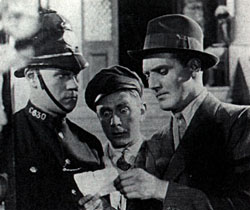
Two Crowded Hours is a 1931 British comedy drama film directed by Michael Powell and starring John Longden, Jane Welsh, and Jerry Verno. It was made as a Quota quickie and is the first film where Powell is credited as the director. No known copies of the film have survived to the present day, and Two Crowded Hours has been declared to be "Missing, Believed Lost" by the British Film Institute.

The Man Behind the Mask is a 1936 British mystery film directed by Michael Powell and starring Hugh Williams, Jane Baxter, Ronald Ward, Maurice Schwartz, George Merritt, Henry Oscar and Peter Gawthorne. A man assaults and switches places with another at a masked ball, and then attempts a major theft – casting suspicion on the original man.
Hotel Splendide is a 1932 British comedy drama film directed by Michael Powell. It was made as a Quota quickie.

The Fire Raisers is a 1934 British drama film directed by Michael Powell. It was described by Powell as "a sort of Warner Brothers newspaper headline story;" and marked the first of his four films with actor Leslie Banks.
Jerome Jackson (1898–1940) was an American film producer and script writer.
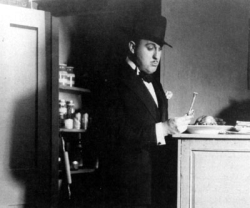
C.O.D. is a 1932 British crime film directed by Michael Powell and starring Garry Marsh, Arthur Stratton and Sybil Grove. A man helps a woman to dispose of the body of her stepfather.

Rynox is a 1932 British crime film directed by Michael Powell and starring Stewart Rome and John Longden. Rynox was adapted from a 1930 novel by popular thriller writer of the day Philip MacDonald.
Someday is a 1935 British romance film, directed by Michael Powell and starring Esmond Knight and Margaret Lockwood. The screenplay was adapted from a novel by I. A. R. Wylie.
My Friend the King is a 1932 British comedy film, directed by Michael Powell and starring Jerry Verno. The film was a follow-up to Two Crowded Hours, Powell's unexpectedly popular directorial debut of the previous year, with comedian Verno reprising his role as a chirpy Cockney taxi driver who gets mixed up in shady doings. This film however was less well-received, with Powell recalling it as "a complete failure", also noting that he worked on six films during 1932 and that "they couldn't all be good...and they weren't".
Hail and Farewell is a 1936 British comedy film directed by Ralph Ince and starring Claude Hulbert. The film was a quota quickie production, following the escapades of a group of British sailors during six hours' shore leave in Southampton. More specific plot details are unknown, as there is no evidence of the film being shown after its first run, the British Film Institute has been unable to locate a print for inclusion in the BFI National Archive, and the film is classified as "missing, believed lost".
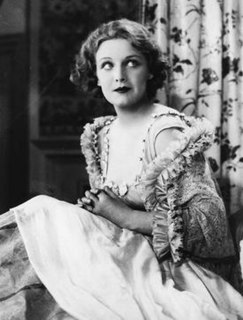
The School for Scandal is a 1930 British historical comedy film directed by Thorold Dickinson and Maurice Elvey and starring Basil Gill, Madeleine Carroll and Ian Fleming. It is the first sound film adaptation of Richard Brinsley Sheridan's play The School for Scandal. It is also the only feature-length film shot using the unsuccessful Raycol colour process, and marked the screen debut of Sally Gray. The film was shot at the Elstree Studios of British International Pictures with sets designed by the art director Lawrence P. Williams. It ended up being released as a second feature and is classified as a quota quickie.
Her Imaginary Lover is a 1933 British comedy film directed by George King and starring Laura La Plante and Percy Marmont.

Knights for a Day is a 1937 British comedy film directed by Norman Lee and starring Nelson Keys, John Garrick and Nancy Burne. It was made as a quota quickie at Welwyn Studios.

By Whose Hand? is a 1932 American mystery film directed by Benjamin Stoloff and starring Ben Lyon, Barbara Weeks and Kenneth Thomson.













